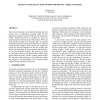Free Online Productivity Tools
i2Speak
i2Symbol
i2OCR
iTex2Img
iWeb2Print
iWeb2Shot
i2Type
iPdf2Split
iPdf2Merge
i2Bopomofo
i2Arabic
i2Style
i2Image
i2PDF
iLatex2Rtf
Sci2ools
WSC
2008
2008
Revisit of stochastic mesh method for pricing American options
We revisit the stochastic mesh method for pricing American options, from a conditioning viewpoint, rather than the importance sampling viewpoint of Broadie and Glasserman (1997). Starting from this new viewpoint, we derive the weights proposed by Broadie and Glasserman (1997) and show that their weights at each exercise date use only the informationof the next exercise date (therefore, we call them forward-looking weights). We also derive new weights that exploit not only the information of the next exercise date but also the information of the last exercise date (therefore, we call them binocular weights). We show how to apply the binocular weights to the Black-Scholes model, more general diffusion models, and the variance-gamma model. We demonstrate the performance of the binocular weights and compare to the performance of the forward-looking weights through numerical experiments.
| Added | 02 Oct 2010 |
| Updated | 02 Oct 2010 |
| Type | Conference |
| Year | 2008 |
| Where | WSC |
| Authors | Guangwu Liu, L. Jeff Hong |
Comments (0)

